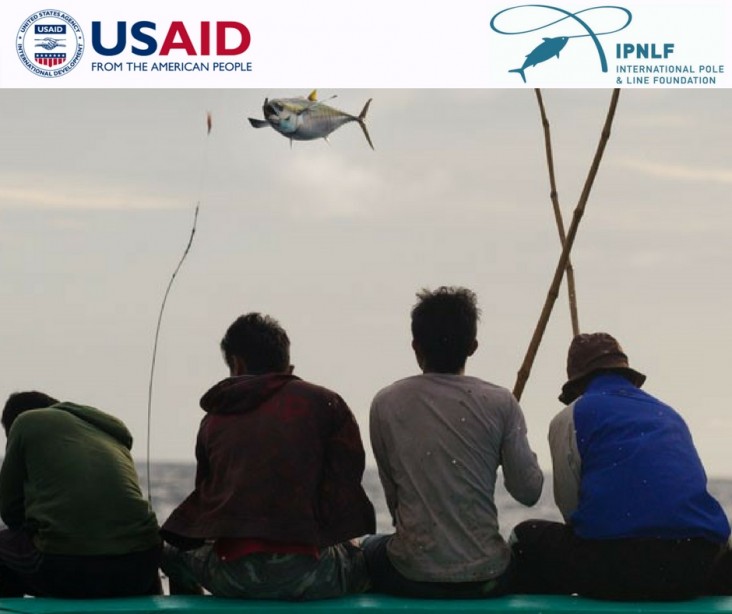
For Immediate Release
BANGKOK – The United States Agency for International Development’s Oceans and Fisheries Partnership (USAID Oceans) and the International Pole & Line Foundation (IPNLF) have embarked on a new collaboration to implement a catch documentation and traceability (CDT) system in Indonesia to support sustainable fisheries management and supply chain integrity.
Traceability has become an integral part of market commitments globally, supporting the ever-increasing need for robust and verifiable information. It is essential in seafood supply chains, offering the opportunity for governments to strengthen fisheries management and improve labor conditions for fishers in addition to providing a market-based approach to deter illegal, unreported and unregulated (IUU) fishing. Precise data on illegal fishing is hard to come by, but in the past the annual cost of IUU to Indonesia, the world’s largest tuna fishing nation, has been estimated at $3 billion a year.
Through the new partnership, USAID Oceans is working closely with IPNLF, the Indonesian Pole & Line and Handline Fisheries Association (AP2HI), and the Indonesian Ministry of Marine Affairs and Fisheries (MMAF) to develop and implement a financially sustainable CDT system that will integrate with existing government and industry systems. IPNLF will engage its Members and networks to build awareness and support in key export markets for implementation of the CDT system and sustainable fisheries management in Indonesia. USAID Oceans and IPNLF are also working closely with Masyarakat dan Perikanan Indonesia (MDPI), a local Indonesian foundation, to develop an Indonesian Coastal Tuna Sustainability Alliance that will support the coordination and scaling of various traceability and sustainable fisheries management initiatives in Indonesia.
The CDT system will support the capture and validation of key data elements on tuna products, including legality and movement from the point of harvest all the way to the end consumer. The system will be piloted in Indonesia and Philippines-based learning sites before expansion in Southeast Asia. The program is working to build partnerships with technology and seafood companies as well as investors to identify sustainable business and investment models for expansion and longevity.
"Customers in key markets like the United States and the European Union are driving the demand for sustainable and fully traceable seafood products, which requires buyers to obtain robust data from their suppliers. Market acceptance therefore provides considerable incentive for fishing companies and processors to adopt strong traceability systems," said Acting USAID Regional Development Mission for Asia Director Todd Sorenson.
In Indonesia, IPNLF initiates practical fishery projects and facilitates stakeholder cooperation to support and improve the country’s one-by-one tuna fisheries. It works closely with AP2HI to contribute to the restoration and protection of Indonesia’s marine and coastal ecosystems, while also ensuring sustainable harvests of tuna for global consumption. This work promotes a transparent and responsible supply chain, ensuring that local communities benefit from the value of one-by-one tuna sales.
"Our partnership with USAID Oceans is vital to ensure that we and our partner, AP2HI, can continue to make improvements in the traceability and sustainability of Indonesia’s coastal tuna fisheries," said Martin Purves, Managing Director of IPNLF. "By giving consumers greater confidence in the products that they are buying, the CDT system will provide invaluable support for the artisanal coastal fisheries we work with, enabling them to maintain their livelihoods and decent living standards while also safeguarding the long-term future of vital fish stocks and marine habitats."
USAID Oceans is one of the many U.S. initiatives in support of the Association of Southeast Asian Nations (ASEAN) and its 10 Member States. The United States partners with ASEAN to support economic integration, expand maritime cooperation, cultivate emerging leaders, promote opportunity for women and address transnational challenges. Through USAID’s cooperation with ASEAN, the United States helps address the root causes of poverty and instability and helps lay the foundation for prosperity and security. The United States and ASEAN celebrate 40 years of partnership in 2017, marking a deepened collaboration under the U.S.-ASEAN Strategic Partnership.
Image(s) supplied are for use with this press release only and are not for archiving, reuse in another context or for distribution to third parties.
ABOUT USAID OCEANS
USAID Oceans is a partnership between USAID and the Southeast Asian Fisheries Development Center. USAID Oceans works to strengthen regional cooperation to combat illegal, unreported, and unregulated fishing, promote sustainable fisheries and conserve marine biodiversity in the Asia-Pacific region. The backbone of the program is the development and implementation of a financially sustainable Catch Documentation and Traceability (CDT) system. This CDT system will be integrated with existing government systems, will also incorporate human welfare data elements, and will be demonstrated within an Ecosystem Approach to Fisheries Management (EAFM) framework. For more information, visit http://seafdec.or.th/
ABOUT IPNLF
The International Pole & Line Foundation (IPNLF) works to develop, support and promote socially and environmentally responsible pole-and-line, handline and troll tuna fisheries around the world. IPNLF’s ambition is to contribute to thriving coastal fisheries, including the people, communities, businesses and seas connected with them. As a hub for sustainably-minded organizations, we use the influence of the market to forge change through practical fishery projects and stakeholder cooperation. IPNLF membership is open to organizations involved in the one-by-one caught tuna supply chain. Allied with our Members, IPNLF demonstrates the value of one-by-one caught tuna to consumers, policymakers and throughout the supply chain. We work across science, policy and the seafood sector, using an evidence-based, solutions-focused approach with guidance from our Scientific & Technical Advisory Committee and Board of Trustees.
IPNLF was officially registered in the United Kingdom in 2012 (Charity 1145586), with branch offices in London and the Maldives and a staff presence in Indonesia.
MEDIA CONTACTS
Richard Nyberg, Email: rnyberg@usaid.gov







Comment
Make a general inquiry or suggest an improvement.